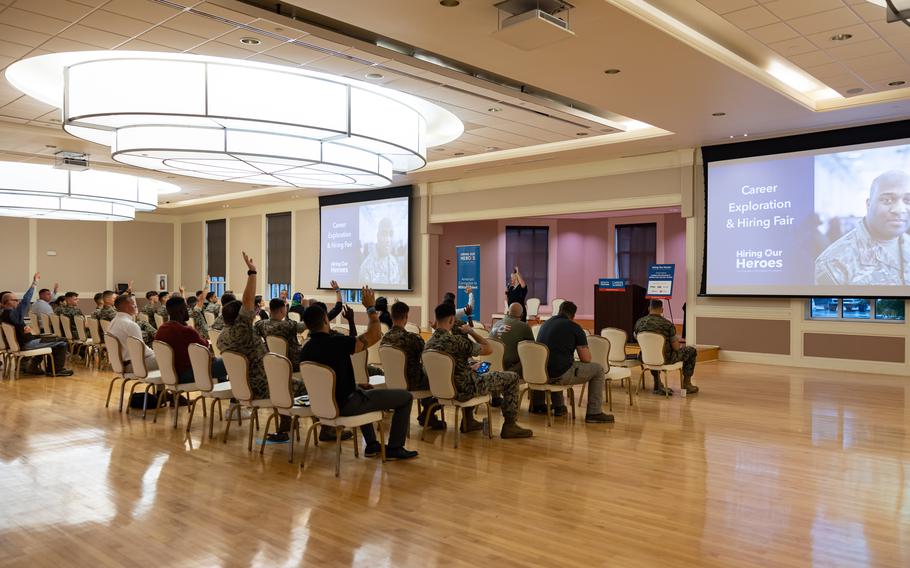
Crystal Kearns, director of events and engagement for Hiring our Heroes, gives remarks during the Hiring Our Heroes Skills and Trades Career Fair at Marston Pavilion on Marine Corps Base Camp Lejeune, N.C., Oct. 12, 2023. (Loriann Dauscher/U.S. Marine Corps)
Every November for nearly 30 years, the United States honors veterans, active service members and their families in observation of National Veterans and Military Families Month. Veterans and military families show tremendous strength and resilience every day, and throughout the month, organizations acknowledge the sacrifices they make for the sustainment of our national security. And while the month-long celebrations are so well-deserved, why shouldn’t organizations be prioritizing and celebrating these individuals and their many unique skills, experiences and perspectives all year?
Organizations that prioritize these groups can benefit from the many valuable skills veterans and military family members bring to the table, including performing under pressure, disciplined work ethic, and the ability to work as a team and strong leadership skills. Vets and military spouses can fill the many open jobs that currently limit U.S. businesses to grow, compete and thrive, but organizations must put in the work year-round to recruit and retain these workers.
So how can companies celebrate, prioritize and understand military-oriented individuals even now that National Veterans and Military Families Month is over? Here are five areas within organizations that can prioritize veterans and military families to foster a “Best Place to Work” culture for all employees:
1. In corporate leadership
Companies with the most successful veteran hiring initiatives and employee resource groups are those led by veterans or military family members themselves. They understand firsthand the unique challenges this group often faces — along with the unparalleled value they add to any team. Organizations that build a leadership team of servicemember-minded executives will be better suited to instill a culture that consistently celebrates and supports these individuals. I have seen the firsthand benefits as I work with several business leaders who served and a CEO whose father is a retired general.
2. In your HR programs
Human Resources plays a big part in moving many veteran initiatives forward. HR should prioritize company benefits that best support veteran employees, including increased military leave and wellness offerings. In addition to individual benefits, HR can help foster a supportive culture. Initiating “buddy” programs, pairing veteran mentors and mentees, implementing support programs, and establishing employee resource groups not only establishes a shared space for veterans but also educates non-veteran employees on how to create an inclusive workplace for veterans. Observing military holidays such as Veterans Day, Memorial Day and Military Spouse Appreciation Day can also highlight an organization-wide commitment to those who have served.
3. In your hiring initiatives
Veterans, whether newly transitioned or those who have long been in the civilian workforce, hold unique and valuable skills that employers need. Seventy-eight percent of HR professionals say veterans have the technical expertise required to fill their open positions, and 80% say veterans have the education needed. However, reaching these prospective employees isn’t easy. The same report found that 36% of employers say recruiting veterans is more difficult than recruiting civilians. Some of the most cited challenges stem from a lack of knowledge on outreach, affordability and skills matching. Leveraging recruiters, hiring tools and onboarding professional services can help better target these subgroups and reach them where they are.
4. In your business strategy
Seeking the right customers, partners and nonprofits for your company to collaborate with is a complicated endeavor, but the best partnerships occur between organizations that hold similar values. Veteran-minded organizations often partner with other teams that share these important values. Companies looking for partnerships like this can look to industry and military-centric events as an avenue to seek out partnerships, being sure to promote their organization’s veteran initiatives when speaking to prospective partners.
5. In your CSR
Support for veterans goes beyond day-to-day operations. Leadership should intertwine veteran and military family-focused organizations into their broader Corporate Social Responsibility plan. Nonprofits such as the Armed Forces YMCA, Building Homes for Heroes, and Fisher House Foundation offer volunteer and donation opportunities for organizations to participate year-round. In addition to showing support, this offers a way to encourage and engage veteran and non-veteran employees in new and meaningful ways that give back to the broader military-family communities. Watching my military and veteran employee group volunteer at events like home dedications for wounded veterans is a deeply humbling experience.
In November and beyond, business leaders benefit from the recruitment, retention and well-being of veteran employees. By recognizing and addressing the unique challenges faced by veterans and military family members and embracing the diverse talents and skills of this workforce, organizations can further foster a culture of inclusivity and create business value in a new, unique way.
Vinnie DiFronzo, a retired Air Force colonel who commanded at the squadron group and wing levels, is senior vice president, Air Force/DOD Agency/Combatant Command Business Unit, at SAIC.